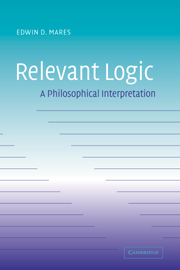Book contents
- Frontmatter
- Contents
- Preface
- Acknowledgements
- I Relevant logic and its semantics
- 1 What is relevant logic and why do we need it?
- 2 Possible worlds and beyond
- 3 Situating implication
- 4 Ontological interlude
- 5 Negation
- 6 Modality, entailment and quantification
- II Conditionals
- III Inference and its applications
- Appendix A The logic R
- Appendix B Routley–Meyer semantics for R
- Glossary
- References
- Index
3 - Situating implication
Published online by Cambridge University Press: 03 September 2009
- Frontmatter
- Contents
- Preface
- Acknowledgements
- I Relevant logic and its semantics
- 1 What is relevant logic and why do we need it?
- 2 Possible worlds and beyond
- 3 Situating implication
- 4 Ontological interlude
- 5 Negation
- 6 Modality, entailment and quantification
- II Conditionals
- III Inference and its applications
- Appendix A The logic R
- Appendix B Routley–Meyer semantics for R
- Glossary
- References
- Index
Summary
The problem of implication
We introduced the problem of implication in the previous chapter. The problem is to give an intuitive semantics for relevant implication. In the previous chapter, we looked at the Routley–Meyer semantics for relevant logic, but we did not give it an interpretation. We cannot claim that relevant logic has an intuitive semantics until we do so. That is the task of the present chapter.
We begin with our basic ontology – the list of things that we presuppose in our semantics. The elements of our ontology are situations and possible worlds, as well as individuals and sets. We have met situations and worlds already in this book, but here and in the next chapter we will look at them in much more depth.
After we introduce our ontology, we give an intuitive semantics for implication using neighbourhoods, which were briefly introduced in the previous chapter. The bulk of the chapter shows how, given a few reasonable assumptions, we can view the Routley–Meyer semantics to be just the intuitive semantics in disguise. In addition, given the resulting interpretation of the Routley–Meyer semantics, we can justify the postulates (given in section 2.13) which yield a semantics for the relevant logic R.
Situations and worlds
We have already been introduced in chapter 2 to the notion of a possible world. Situations are somewhat less familiar objects to philosophers and semanticists and we will begin with them. They were introduced into logic in the early 1960s by Saul Kripke, who used ‘evidential situations’ in his model theory for intuitionist logic (Kripke 1965a).
- Type
- Chapter
- Information
- Relevant LogicA Philosophical Interpretation, pp. 39 - 56Publisher: Cambridge University PressPrint publication year: 2004



